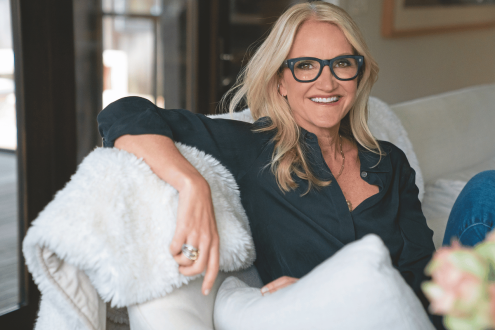How do you define success? Examining 5 areas of your life
When defining success, we typically think about our careers - but it might be time to examine the other key areas in our lives...

As the landscape of our working lives changes beyond recognition, challenging our preconceptions about what’s necessary to ‘get on’ in life, it’s time to take a fresh look and ask yourself, ‘how do you define success?’, Anna Lundeburg writes…
If I were to ask you, how do you define ‘success’, what would you say? Would you describe the corporate executive who has climbed the career ladder and now earns a seven-figure salary? The social entrepreneur, a renowned keynote speaker and bestselling author? Or the friend who seems so content with her life?
It might sound idealistic and privileged to spend time on the semantics of how to define success. Most of us will go through our lives keeping busy, always working towards that next milestone, never stopping to think if it’s what we really want. But what happens when we don’t define what ‘success’ means to us?
What really matters in life?
There are moments in life that prompt us to question what truly matters – when we become parents, or lose a loved one. Or when global events trigger a rethink – a worldwide pandemic; the threat of war.
During the past two years, in many ways, we’ve had to lower our ambitions. Our health goals have focused on avoiding getting infected with Covid. At work, for many of us success has meant having a strong wi-fi signal for a meeting or being eligible for furlough.

Rediscovering our values
In family life, we’ve been trying not to kill each other while living and working together. We’ve also rediscovered the value of things that we previously took for granted. The freedom to go for a walk whenever we want. The privilege of international travel. The value of connection and community. And our approach to exercise has also modified.
‘People have realised that they don’t have to go to a gym, they don’t need all the equipment, and they don’t need to make time for that big workout session anymore,’ says Louise Buttler, Pilates instructor and founder of on-demand wellness hub Live Brave.
‘The type of exercise has changed, too,’ she adds. ‘We’re slowing down and becoming more mindful, alternating intense HIIT workouts with things such as yoga and breathwork. And we’re enjoying the community aspect of working out together.’
How the pandemic affected our work lives
The biggest reappraisal, due to the pandemic, has been in work. Having experienced a different way of working – one without the long commute and late hours in the office, with more time and energy for our families and home life – we’re wondering if there isn’t a better way than the traditional ‘nine to five’. A more flexible, less stressful way of navigating our careers.
We talk about ‘work-life balance’ but it’s not just ‘work’ on one side and ‘life’ on the other. In my experience, there are five key areas in our lives to consider for us to thrive and live a truly successful life in a more whole and holistic sense.
You can use this model – what I call the ‘5Ls’: Live, Love, Learn, Lead, Laugh – to help you consider a broader definition of success beyond just work, and to redefine success within each of these areas.

LIVE: Finding success in your health and wellness
When you measure success solely by your achievements at work, one of the areas that inevitably gets neglected is your health. Stress levels are high as you work to tight deadlines late into the night, but you keep slogging away, believing it’s the price you have to pay to get on.
But without your health, even the pursuit of conventional success will be difficult and ultimately unsustainable. True success requires you to put your health first. It’s not just about ‘not being ill’; the World Health Organisation defines health as ‘a state of complete physical, mental and social wellbeing’.
It’s also not about putting pressure on yourself to train, meditate and eat a perfect diet every day. ‘Find something that makes you feel good,’ advises Buttler.
‘It might be a programme you enjoy, an instructor that you click with, or a particular exercise that you love doing. If you don’t enjoy it, you’re not going to want to do it every day.’ Move every day because you want to, not just because you feel you ‘should’. Slow down.

LOVE: Finding success in relationships and belonging
It might seem strange to talk about ‘success’ in the context of relationships. But you grow up with a set of assumptions about what romantic partnerships and families ‘should’ look like, and not meeting those expectations can leave you feeling like you’ve failed.
Loneliness is subjective, and we each have different needs; there are some things we have in common, however. As Dr Duana Welch, an expert in research-based relationship advice, affirms, ‘We all need love. We all need meaning. And relationships based on kindness and respect will always thrive.’
In a world in which we can spend the day together, engrossed in our individual devices, it’s about quality over quantity. ‘The simplest way to instantly enhance relationships,’ says Dr Welch, ‘is in the tiny moments. When someone you love asks for your attention, give it.
‘Look up when they enter the room. Hug them when they come to you. Put the phone down. Ask questions and really listen. Give your full attention in a loving way, and watch your relationships improve,’ Dr Welch adds.

LEARN: Finding success in personal development
Your early years are all about learning, and success is measured by how you perform at school. As you get older, you get more comfortable, settling into a routine and sticking to what you know. But outside your comfort zone, as the saying goes, is where the magic happens.
Learning new skills keeps you relevant and competitive at work. It brings interesting new perspectives, ideas and career opportunities. And it’s intrinsically rewarding. ‘Learning’ can mean a formal academic or professional education, but it can also be practical or creative, and doesn’t require time off work for full-time study.
There are endless resources available to learn for free, anywhere, any time, and to suit any learning style. Start small by listening to a new podcast, reading a book, or watching an interesting YouTube video.

LAUGH: Finding success in your free time
Free time?’ I hear you scoff, ‘What free time?!’ With endless to-do lists, and work-life divisions blurring, your personal needs and interests come last, after all your obligations as a parent, professional and responsible adult.
Eve Rodsky, the New YorkTimes bestselling author of Fair Play (Quercus, £12.99), calls it your ‘unicorn space’ – time to express yourself creatively; what makes you uniquely you. ‘A creative life is not a nice-to-have but a must-have,’ she says.
‘It is essential to our sense of self, our physical and mental wellbeing, the health of our partnerships, and our ability to model what a full life looks like to our children, our friends and colleagues, and our communities,’ Eve adds.
Give yourself permission to prioritise time for you and your interests. Schedule it, set clear boundaries. And if you don’t know what your unicorn space is? Get curious and find out.

LEAD: Finding success in your career and impact
It’s usually after a decade or two of progressing ‘successfully’ in your career that you start questioning, ‘Is this it?’ Still, you cling to society’s traditional markers of success, you feel you’re too invested and, anyway, you don’t know what to do instead.
But, as management guru Stephen Covey said, ‘It doesn’t matter how fast you’re going if you’re headed in the wrong direction.’ Consider the cost – to you, your health, and your relationships – of those extra hours after the kids’ bedtime, doing work you don’t enjoy, for an employer who doesn’t care.
It usually comes down to money, as you’ve built a life and lifestyle around a certain salary. But have you looked at how much you need? And what else matters, beyond the money?
Is it time for doing work that you love? Feeling like you’re making a difference? How do you want your work to fit around your family and personal life? What regrets might you have later if you don’t make changes now?
How to find success in the 5 areas of life
As you consider success across these five areas, ask yourself: Where is the biggest imbalance? Where do you feel the strongest pull to re-evaluate your goals? How can you make time to reflect on what you want?
Consider what the priority is right now, so that you can make immediate adjustments. Then look ahead to three, five, 10 years. Are the children going to be startingschool? Are you about to become an empty nester? Is retirement looming?
How can you plan for these upcoming shifts? Asking yourself, ‘how do you define success?’, puts the onus on yourself to do the work, to find out what it is that you really want. But when you do – that’s when the magic happens.
How do you define success: further resources for inspiration
LISTEN: The Reimagining Success podcast sees Anna Lundberg explore how we can move towards a more balanced definition of success outside of the conventional nine to five.
READ: In Find Your Unicorn Space (Penguin Random House, £14.99, available now on Kindle and in hardcover, paperback released 29 July), Eve Rodsky combines inspiration with advice on how you can (re)discover what makes you come alive.
READ: Ikigai: The Japanese Secret To A Long And Happy Life by Héctor GarcÍa and Francesc Miralles (Cornerstone, £12.99) seeks to help you find that reason for jumping out of bed in the morning.









